Comparison Between Court Marriage and Civil Marriage
Court marriage and civil marriage are two distinct legal procedures for formalizing a union between two individuals. While they serve similar purposes, there are notable differences in process, legal requirements, and implications. Here’s a comparison between court marriage and civil marriage:
- Legal Procedure:
- Court Marriage: In court marriage, the couple appears before a judge or magistrate to solemnize their marriage. The ceremony typically occurs in a courtroom, where the judge officiates the marriage.
- Civil Marriage: Civil marriage involves obtaining a marriage license from a government authority, such as a city hall or municipal office. The couple can then have a civil ceremony by a government-appointed officiant or authorized celebrant.
- Venue:
- Court Marriage: As the name suggests, court marriage ceremonies are conducted within the premises of a court of law, usually in a courtroom.
- Civil Marriage: Civil marriage ceremonies can occur in various locations, including city halls, municipal offices, or any venue approved by the government authority issuing the marriage license.
- Officiant:
- Court Marriage: A judge or magistrate officiates court marriages, ensuring that the marriage is conducted according to legal requirements.
- Civil Marriage: Civil marriages may be officiated by a government-appointed officiant, such as a registrar or justice of the peace, authorized to solemnize marriages.
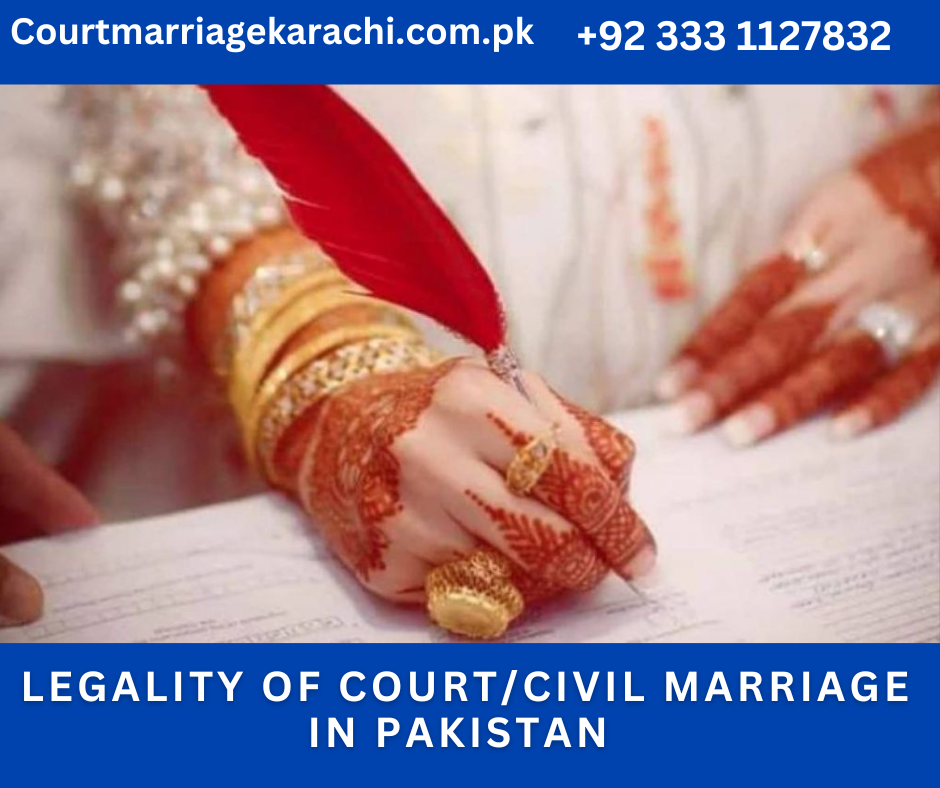
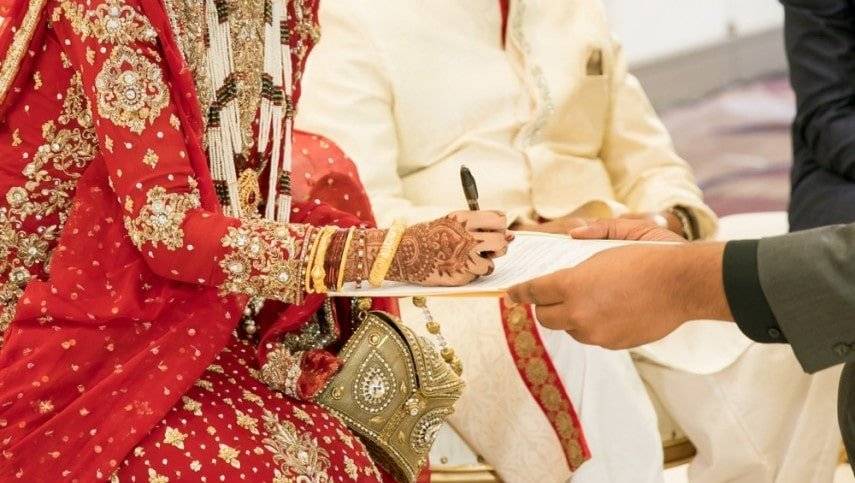
- Legal Requirements:
- Court Marriage: The legal requirements for court marriage may vary depending on the jurisdiction but typically involve presenting valid identification, completing the necessary paperwork, and fulfilling any additional requirements specified by the court.
- Civil Marriage: To obtain a marriage license for a civil marriage, the couple usually needs to provide proof of identity, age, and marital status, along with any required documentation. The marriage license must be obtained before the ceremony can take place.
- Recognition and Validity:
- Court Marriage: Court marriages are legally recognized and binding, provided they comply with the relevant laws and regulations governing marriage in the jurisdiction where the marriage occurs.
- Civil Marriage: Civil marriages are also legally recognized and carry the same legal status as court marriages as long as they meet the requirements prescribed by the governing authority.
- Religious Considerations:
- Court Marriage: Court marriages are typically secular ceremonies and do not involve religious rites or rituals.
- Civil Marriage: While civil marriages are secular in nature, couples may choose to incorporate religious elements into their ceremony if desired, although the legal aspect remains separate from religious considerations.
- In summary, court marriage and civil marriage are both legally valid ways of solemnizing a union between two individuals, but they differ in terms of procedure, venue, officiant, legal requirements, and religious considerations. Couples may choose the option that best suits their preferences, cultural background, and legal obligations.

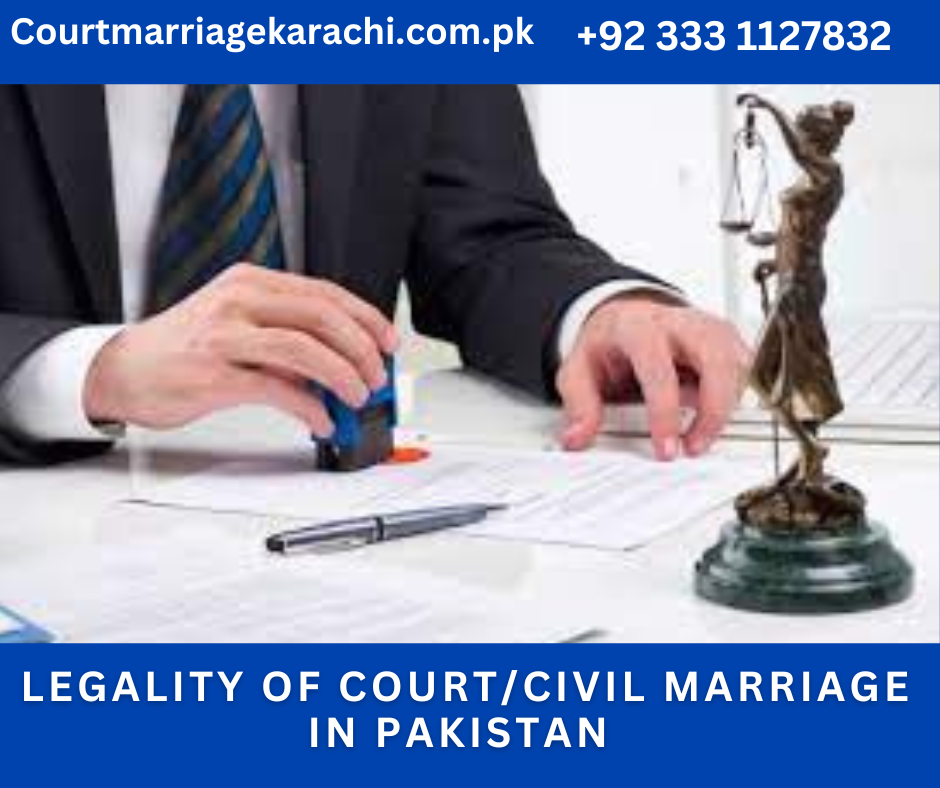
Exploring the Legality of Court Marriage/Civil Marriage in Pakistan
Overview of Court Marriage/Civil Marriage in Pakistan
Court marriage, also known as civil marriage, is a legally recognized union between two individuals solemnized before a court of law rather than through traditional religious ceremonies. In Pakistan, court marriage offers couples an alternative and lawfully valid way to formalize their relationship.
Legal Framework:
The legality of court marriage in Pakistan is established under the Pakistan Family Laws Ordinance, 1961. This ordinance provides the legal framework for court marriages and governs the rights and responsibilities of parties involved. It allows individuals of any religion or faith to marry through a civil ceremony, ensuring that such marriages are valid and enforceable under Pakistani law.
Recognition and Enforcement:
Court marriages conducted per the provisions of the Pakistan Family Laws Ordinance, 1961, are legally recognized and enforceable throughout Pakistan. The marriage certificate issued by the court serves as conclusive evidence of the marital relationship and facilitates the registration of the marriage with government authorities and financial institutions.
Religious Neutrality:Civil Marriage/Court Marriage
One of the critical aspects of court marriage in Pakistan is its religious neutrality. Unlike traditional religious ceremonies, court marriages allow couples of different faiths or those seeking a secular ceremony to marry without religious constraints or requirements. This ensures equal treatment and legal protection for all couples, regardless of their religious beliefs.
Legal Implications: Civil Marriage/Court Marriage
Court marriages in Pakistan have legal implications similar to those of traditional marriages. They confer rights and responsibilities related to inheritance, property ownership, and spousal support upon the parties involved. Additionally, court marriages provide legal protection to spouses and children, safeguarding their interests under the law.
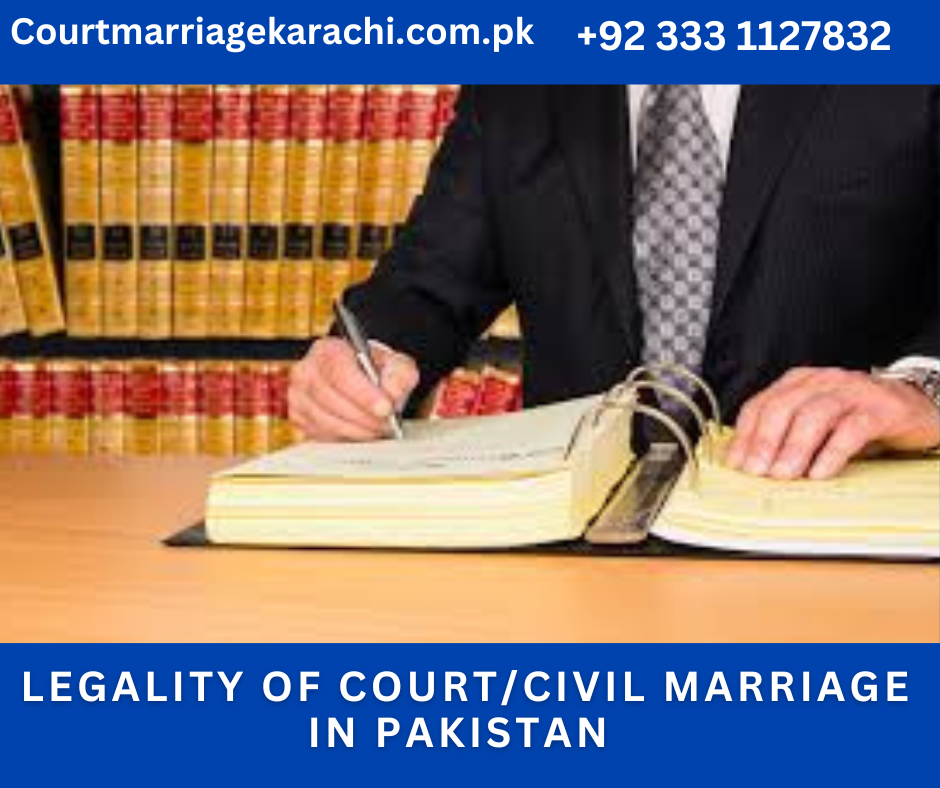

Civil Marriage/Court Marriage: Simplified Process:
One of the advantages of court marriage in Pakistan is its simplified process. The procedure is relatively straightforward and does not involve elaborate rituals or ceremonies. This makes it convenient for couples seeking to formalize their relationship without unnecessary complications.
Court Marriage/Civil Marriage: Law of Pakistan
The legality of court marriage in Pakistan is firmly established under the Pakistan Family Laws Ordinance, 1961. Court marriages conducted under this ordinance are legally recognized and enforceable throughout the country, providing couples with a convenient and legally valid way to solemnize their union. Understanding the legal framework and implications of court marriage can help couples navigate this important milestone confidently and clearly.
The Simplified Process of Court Marriage/Civil Marriage in Pakistan
Introduction
Court marriage, or civil marriage, is a straightforward and legally recognized union between two individuals solemnized before a court of law. In Pakistan, court marriage is designed to be simple and accessible, providing couples a convenient way to formalize their relationship without unnecessary complications or delays.
Step-by-Step Process:
Submission of Application
- The first step in court marriage in Pakistan involves the couple submitting an application to the relevant District Marriage Registration Office. This application includes basic information about the individuals intending to marry, such as their names, addresses, ages, and proof of identity.
Verification of Documents
- Once the application is submitted, the authorities at the Marriage Registration Office verify the documents provided by the couple. These documents typically include proof of identity, such as National Identity Cards (NICs) or passports, as well as proof of age and marital status.
Issuance of Notice
- After the documents are verified, a public notice of the intended marriage is posted at the office of the Marriage Registrar for a specified period, usually 30 days. This notice is designed to allow for any objections to be raised against the marriage.
Objection Period
- During the notice period, the process proceeds smoothly if no objections are raised against the marriage. However, if any objections are raised, they must be addressed and resolved before the marriage can be solemnized.
Marriage Solemnization
- Once the notice period has elapsed and no objections are raised, the court solemnizes the marriage in the presence of the couple, witnesses, and the Marriage Registrar. The ceremony typically involves the exchange of vows and the signing of the marriage register.
Issuance of Marriage Certificate
- Following the solemnization of the marriage, the Marriage Registrar issues a marriage certificate to the couple. This certificate is conclusive evidence of the marital relationship and is required for various legal purposes, such as obtaining spousal visas or registering the marriage with government authorities.
Key Features of the Process:
- Accessibility: Court marriage in Pakistan is accessible to all individuals, regardless of their religious or cultural background.
- Efficiency: Unlike traditional religious ceremonies, which may involve elaborate rituals and ceremonies, court marriage proceedings are typically completed within a relatively short period, ensuring a swift and efficient process.
- Legal Validity: Court marriages conducted per Pakistani law are legally recognized and enforceable, providing couples with legal protection and rights.
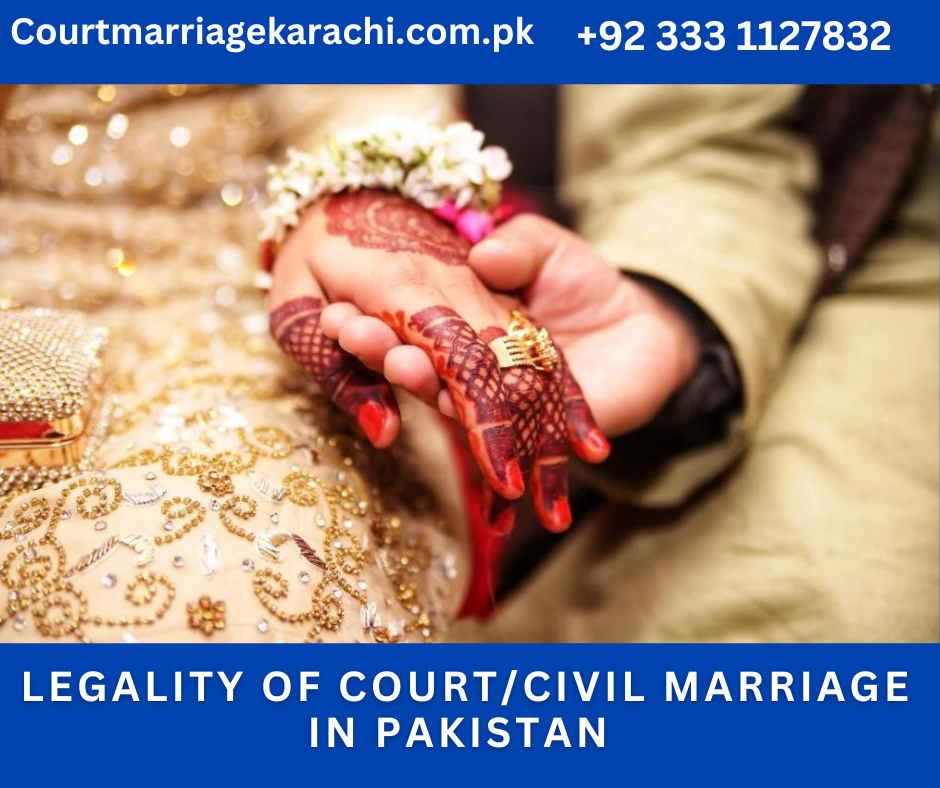
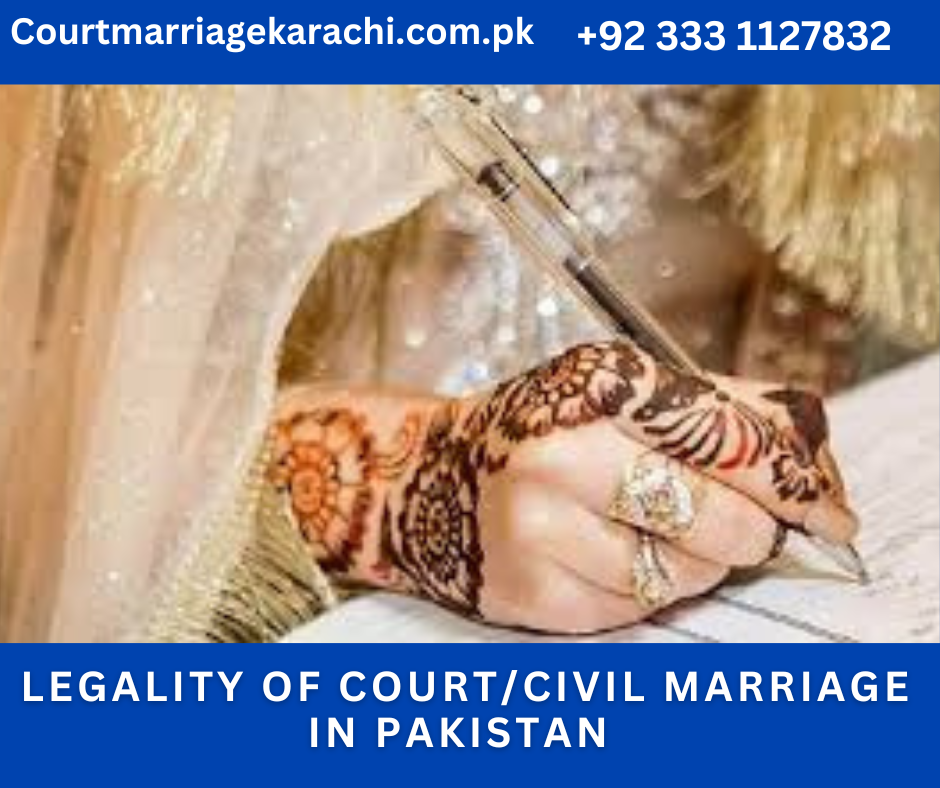
Court Marriage/Civil Marriage in Pakistan: Simplified
The simplicity and efficiency of the court marriage process in Pakistan make it an attractive option for couples seeking to formalize their relationship in a legally recognized manner. By following a few straightforward steps and meeting the requirements, couples can embark on their marital journey with ease and confidence.
Benefits of the Simple Process:
Convenience
- The streamlined process of court marriage in Pakistan offers couples a convenient and hassle-free way to formalize their relationship without unnecessary delays or complications.
Accessibility
- Court marriage is accessible to all individuals, regardless of their religious beliefs or background. It provides a legally valid alternative to traditional religious ceremonies, promoting inclusivity and equal treatment under the law.
Legal Validity
- Court marriages conducted per the prescribed legal procedure are legally recognized and enforceable under Pakistani law. The marriage certificate issued by the court carries the same legal weight as certificates from traditional religious ceremonies.
The simple process of court marriage in Pakistan underscores the country’s commitment to providing couples with a straightforward and legally recognized way to solemnize their union. By offering convenience, accessibility, and legal validity, court marriage ensures couples can embark on their marital journey easily and confidently.
Facilitating Court Marriage/Civil Marriage Services at Courtmarriagekarachi.com.pk
At courtmarriagekarachi.com.pk, we understand the significance of court marriage as a legal and solemn union between two individuals. Our dedicated team of court marriage lawyers is committed to providing comprehensive services to couples seeking to formalize their relationship through court marriage in Pakistan. With our expertise and legal acumen, we ensure that every step of the process is conducted meticulously and by the law.
Court/Civil Marriage Lawyers: Legal Guidance and Assistance
Our experienced court marriage lawyers offer expert guidance and assistance to couples throughout the court marriage process. From the initial consultation to finalizing legal formalities, we are with our clients every step of the way. Our lawyers meticulously handle all aspects of the court marriage procedure, ensuring that all legal requirements are met and the process proceeds smoothly.
Court Marriage/Civil Marriage Lawyers: Document Preparation and Verification
One of the essential aspects of court marriage is the preparation and verification of legal documents. Our courtmarriagekarachi.com.pk team assists couples in preparing all necessary documentation required for court marriage. We ensure that the papers are accurately completed and comply with legal requirements. Additionally, we verify the authenticity of the documents to avoid any delays or complications during the court marriage process.
Court Marriage/Civil Marriage Lawyers: Representation Before Authorities
Our court marriage lawyers represent couples before the relevant authorities, including the Marriage Registrar and court officials. We handle all communication and interactions with these authorities on behalf of our clients, ensuring that their rights and interests are protected throughout the process. Our lawyers advocate for our client’s best interests and strive to achieve a favorable outcome for them.
Court Marriage/Civil Marriage Lawyers: Legal Compliance and Assurance
At courtmarriagekarachi.com.pk, we prioritize legal compliance and assurance in every court marriage case. Our lawyers ensure that all legal procedures are followed meticulously and that the court marriage is fully compliant with the law. We provide our clients with the assurance and peace of mind that their court marriage is legally valid and enforceable under Pakistani law.
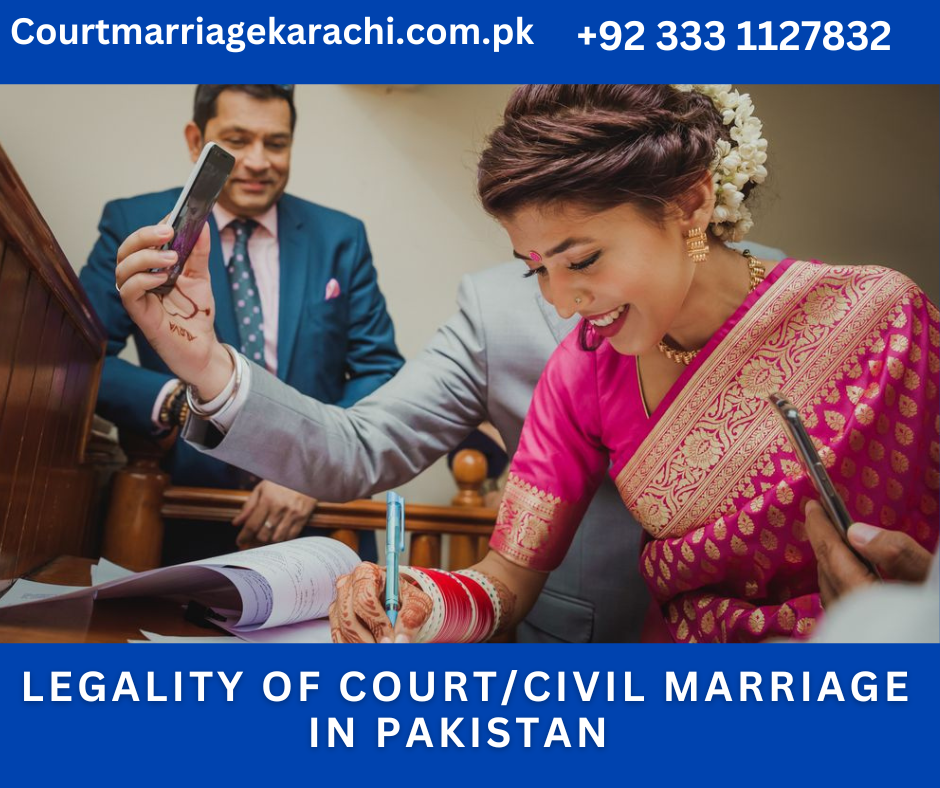
Court Marriage/Civil Marriage Lawyers: Tailored Solutions and Personalized Service
We recognize that every court marriage case is unique, and we tailor our services to meet each client’s specific needs and preferences. Our court marriage lawyers pay personalized attention to every detail of the court marriage process, ensuring our clients receive the highest level of service and support. We are committed to delivering tailored solutions that exceed our clients’ expectations.
Court Marriage/Civil Marriage Lawyers
We take pride in providing exemplary court marriage services with the assistance of our dedicated court marriage lawyers. With our expertise, legal guidance, and personalized approach, we strive to make the court marriage process seamless and stress-free for our clients. Couples can contact and trust us to handle their court marriage with professionalism, integrity, and precision, ensuring a smooth and legally valid union.
